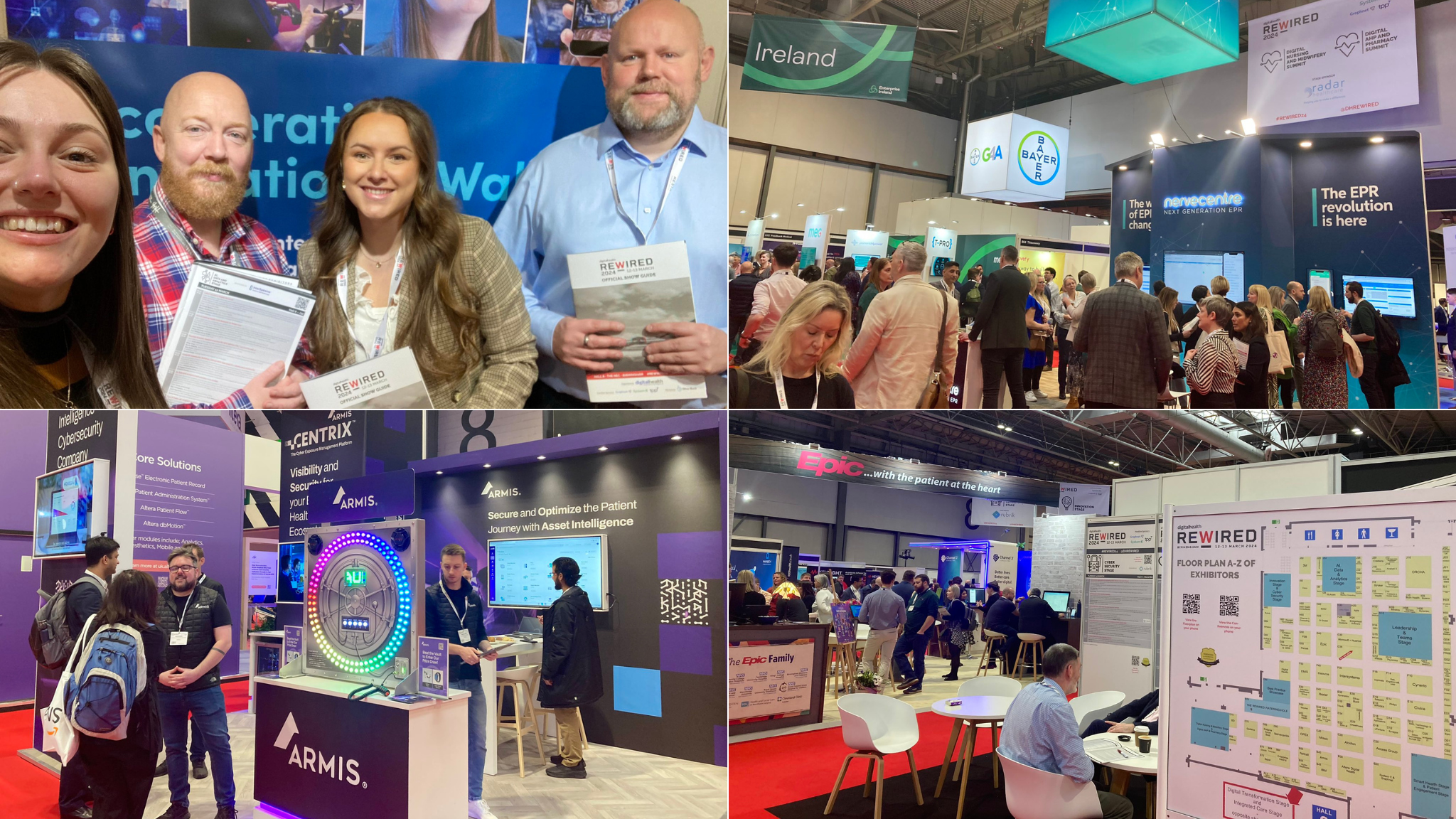I recently attended Digital Health Rewired 2024 at the NEC in Birmingham, an event that explores cutting-edge healthcare technology and innovation. In this blog we explore the significance of innovation and collaboration, continuing to echo and redefine healthcare.

Utilising Artificial Intelligence and digital innovations to accelerate patient access and services in healthcare
One keynote session focused on utilising AI for patient access and services in healthcare, shining a spotlight on some of the innovative initiatives in the UK. Supported by the NHS Innovation Accelerator programme, curating innovations and driving new advancements in healthcare.
Anya AI – revolutionising maternity care:
Dr Chen Mao Davies, the founder and CEO of Anya AI, shared her personal journey as a mother and the challenges she faced, including post-natal depression, and the lack of support during those vulnerable stages as a parent. Leveraging her background in CGI, she founded Anya AI to revolutionise women’s access to 24/7 support in maternity care…
Anya AI offers personalised support for pregnancy, parenting, menopause and fertility, with video consultations and 1-1 support powered by clinically safe AI. Talking to a specialist, or clinician during out of work hours isn’t easily accessible. However, patients can easily access specialists and clinicians outside of work hours, simply by requesting a chat through the same chatbot platform.
“Anya provides personalised support during this critical journey of life. We’ve built many different features in the app to care for specific needs. Anya isn’t replacing the current support, it isn’t a medical device, it’s supporting and providing informational advice. If it spots safeguarding issues, it will signpost the patient to the right services such as GP medical support. We can see the fear of AI, although the more we use, and show the evidence of how it’s helping mothers, clinicians and GPs can see why adopting Anya is the way to go.” - Dr Chen Mao Davies – founder and CEO, Anya
Anya AI collaborates with the NHS to make maternity care equitable for everyone. It currently reaches 7 million people in the UK through public health commissioning, and has now received phase two SBRI funding to tackle housing inequalities in maternity care.
“It’s really important to collaborate in the industry. Competition isn’t seen as a good thing – we all have the same problems, why aren’t we collaborating and innovating together to get these services and new innovations to the frontline faster.” - Michael Watts, managing director, Emergency Role Allocation Systems (ERAS)
Limbic – AI in mental health services:
Zohra Khaku, Director of Strategic Partnerships at Limbic, discussed the role of AI in reducing barriers to accessing mental health services...
Limbic offers free, self-referral mental health services for the 13 most common issues such as anxiety and depression, using AI to streamline the process. The platform engages patients through a chatbot interface which collects necessary information and assists in the referral process. Limbic AI is currently used by a number of trusts through the NHS Foundation Trust.
The platform ensures patient engagement, with a high completion rate of 92%, and addresses issues such as dropout rates and access to services, especially during critical times like evenings and weekends. Providing a care companion to the patient to receive information at more vulnerable times.
“People have their thoughts around AI. Just to be really clear, we’re not trying to replace clinicians, we’re trying to augment and support their work.” Zohra Khaku
Limbic’s chatbot streamlines clinician-patient interactions by automating referral questionnaires, saving valuable time for clinicians to focus on patient care. With patients already engaged and key referral questions collected, clinicians can prioritise on building relationships and accessing appropriate care.
The value of Limbic is that it can catch mental health issues early, saving the NHS money, increasing the recovery rate, and getting patients the right diagnosis from clinicians.
Overall, the keynote session emphasised the transformative potential of AI-driven innovations in healthcare, particularly in improving patient access, outcomes, and experiences.
The challenges of Chat GPT vs Human doctors…
During the two-day event exploring innovation in healthcare, we’ve seen the impact AI is having on driving the ecosystem, and will inevitably continue advancing. However, in another captivating keynote session, we saw an active interplay between ChatGPT and human doctors, engaging in a thought-provoking discussion on the role of AI tools in clinical diagnosis.
The session explored strategic scenarios for enhancing confidence in AI, employing ChatGPT 3.5 and 4, framing each query as if posed by a member of the public seeking information on various health concerns. In some scenarios, ChatGPT offered information and ‘sometimes’ suggestions for seeking professional evaluation. However, concerns surfaced when the scenarios involved more complex questions, such as determining the correct dosage of medications.
“It’s common that users are asking ChatGPT these sort of questions. People are using these devices because they’re finding it hard getting the information that they need somewhere else, knowing how difficult it is to get in contact with your GP. Although there are some dangers of users using it for more than information, but for advice.” - Dr Keith Grimes (Digital Health and Innovation Consultant)
As these discussions progressed, ethical questions and operational challenges emerged. Concerns were raised regarding the potential consequences of ChatGPT’s responses, including the management of patient expectations and the risk of misinformation. Despite its informational capabilities, clinicians pointed out in this more serious scenario that ChatGPT currently knows no boundaries, as the type of answer it relayed suggested a multiplication of the dosage amount, posing a serious risk to patient.
“We need to be careful of the knock-on effect of ChatGPT’s responses. What’s the knock-on effect of more patients using this and coming to you with this information. We need to understand it, its efficiencies, and recognise its current limitations” Michael Watts, (associate CCIO, University Hospitals of Derby and Burton NHS Foundation Trust, and Managing director, Blum Health)
The session concluded with reflections on the evolving role of AI in healthcare, emphasising the need for ethical frameworks, user education, and ongoing dialogue between technology and medical communities. Whilst ChatGPT offers valuable insights, it’s hard to know the factual and honest information when it’s so confidently wrong in some instances. Highlighting the need for continued refinement and responsible integration of AI tools within clinical practice.
ChatGPT’s limitations highlight the irreplaceable role of human doctors, and the importance of leveraging AI as an assistive tool rather than a definite source of medical advice. Whilst ChatGPT offers convenience and accessibility, its use must be accompanied by a critical understanding of its capabilities and limitations.
Integrated digital technologies – the future in healthcare
The landscape of healthcare is experiencing a significant shift driven by digital innovation. Industry leaders shed light on the pivotal role of digital technologies in shaping the future of healthcare delivery. These discussions highlighted several key areas such as:
- New Generation Hospitals – the vision that hospitals are evolving beyond traditional walls, embracing a fully digitalised service like home testing and virtual consultations. This personalised approach aims for proactive, patient-centric care to minimise waiting times, and optimise resources.
- Virtual Care and Clinical Enablement – Digital technologies are opening doors to virtual care, reducing hospital admissions and streamlining clinical workflows. AI-driven solutions are taking on administrative tasks, allowing clinicians to focus on high-value patient interactions.
- Population Health and Remote Monitoring – healthcare systems are increasingly leveraging data insights to target interventions effectively and shifting towards preventative care. By embracing remote monitoring technologies, clinicians and healthcare providers can remotely monitor patients’ health status, reducing the need for frequent hospital admissions, A&E visits and appointments with GPs.
There were key discussion points addressed around digital transformation in Wales, seen as a catalyst for economic health outcomes. Embracing digital technologies isn’t just important for driving cultural change, but also for fostering innovation. By prioritizing investments and reimagining service delivery, Wales is committed to leveraging the power of digital to improve the wellbeing of its population.
In conclusion, digital innovation is revolutionising healthcare delivery, offering unprecedented opportunities to enhance patient care, optimise resource allocation, and drive economic growth. Through embracing a collaborative, patient-centric approach, healthcare systems are unlocking the potential of digital technologies to pave the way for a healthier, more resilient future.
If you didn’t catch us at the event but would like to learn more about how we can support you in propelling innovation to the health and social care frontline, then please get in touch.



